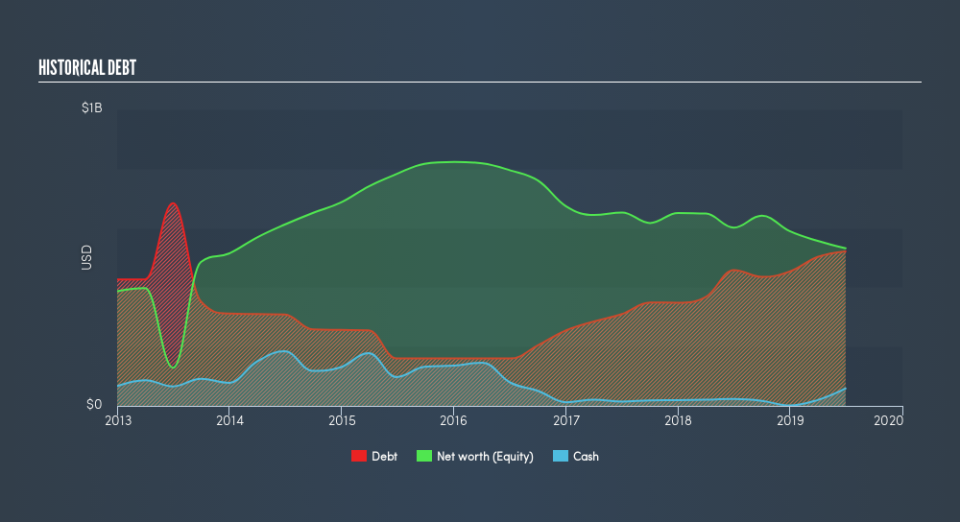Does Sprouts Farmers Market (NASDAQ:SFM) Have A Healthy Balance Sheet?

David Iben put it well when he said, 'Volatility is not a risk we care about. What we care about is avoiding the permanent loss of capital.' When we think about how risky a company is, we always like to look at its use of debt, since debt overload can lead to ruin. We can see that Sprouts Farmers Market, Inc. (NASDAQ:SFM) does use debt in its business. But is this debt a concern to shareholders?
What Risk Does Debt Bring?
Debt and other liabilities become risky for a business when it cannot easily fulfill those obligations, either with free cash flow or by raising capital at an attractive price. Part and parcel of capitalism is the process of 'creative destruction' where failed businesses are mercilessly liquidated by their bankers. However, a more usual (but still expensive) situation is where a company must dilute shareholders at a cheap share price simply to get debt under control. Of course, debt can be an important tool in businesses, particularly capital heavy businesses. When we examine debt levels, we first consider both cash and debt levels, together.
See our latest analysis for Sprouts Farmers Market
What Is Sprouts Farmers Market's Net Debt?
As you can see below, Sprouts Farmers Market had US$521.2m of debt at June 2019, down from US$594.0m a year prior. On the flip side, it has US$58.6m in cash leading to net debt of about US$462.5m.
How Healthy Is Sprouts Farmers Market's Balance Sheet?
According to the last reported balance sheet, Sprouts Farmers Market had liabilities of US$449.6m due within 12 months, and liabilities of US$1.71b due beyond 12 months. Offsetting this, it had US$58.6m in cash and US$13.2m in receivables that were due within 12 months. So it has liabilities totalling US$2.09b more than its cash and near-term receivables, combined.
This deficit is considerable relative to its market capitalization of US$2.09b, so it does suggest shareholders should keep an eye on Sprouts Farmers Market's use of debt. This suggests shareholders would heavily diluted if the company needed to shore up its balance sheet in a hurry.
We use two main ratios to inform us about debt levels relative to earnings. The first is net debt divided by earnings before interest, tax, depreciation, and amortization (EBITDA), while the second is how many times its earnings before interest and tax (EBIT) covers its interest expense (or its interest cover, for short). This way, we consider both the absolute quantum of the debt, as well as the interest rates paid on it.
With net debt sitting at just 1.4 times EBITDA, Sprouts Farmers Market is arguably pretty conservatively geared. And it boasts interest cover of 8.9 times, which is more than adequate. But the other side of the story is that Sprouts Farmers Market saw its EBIT decline by 3.5% over the last year. That sort of decline, if sustained, will obviously make debt harder to handle. When analysing debt levels, the balance sheet is the obvious place to start. But it is future earnings, more than anything, that will determine Sprouts Farmers Market's ability to maintain a healthy balance sheet going forward. So if you want to see what the professionals think, you might find this free report on analyst profit forecasts to be interesting.
Finally, a company can only pay off debt with cold hard cash, not accounting profits. So the logical step is to look at the proportion of that EBIT that is matched by actual free cash flow. During the last three years, Sprouts Farmers Market produced sturdy free cash flow equating to 59% of its EBIT, about what we'd expect. This free cash flow puts the company in a good position to pay down debt, when appropriate.
Our View
Even if we have reservations about how easily Sprouts Farmers Market is capable of staying on top of its total liabilities, its interest cover and conversion of EBIT to free cash flow make us think feel relatively unconcerned. We think that Sprouts Farmers Market's debt does make it a bit risky, after considering the aforementioned data points together. Not all risk is bad, as it can boost share price returns if it pays off, but this debt risk is worth keeping in mind. Given our hesitation about the stock, it would be good to know if Sprouts Farmers Market insiders have sold any shares recently. You click here to find out if insiders have sold recently.
When all is said and done, sometimes its easier to focus on companies that don't even need debt. Readers can access a list of growth stocks with zero net debt 100% free, right now.
We aim to bring you long-term focused research analysis driven by fundamental data. Note that our analysis may not factor in the latest price-sensitive company announcements or qualitative material.
If you spot an error that warrants correction, please contact the editor at editorial-team@simplywallst.com. This article by Simply Wall St is general in nature. It does not constitute a recommendation to buy or sell any stock, and does not take account of your objectives, or your financial situation. Simply Wall St has no position in the stocks mentioned. Thank you for reading.

